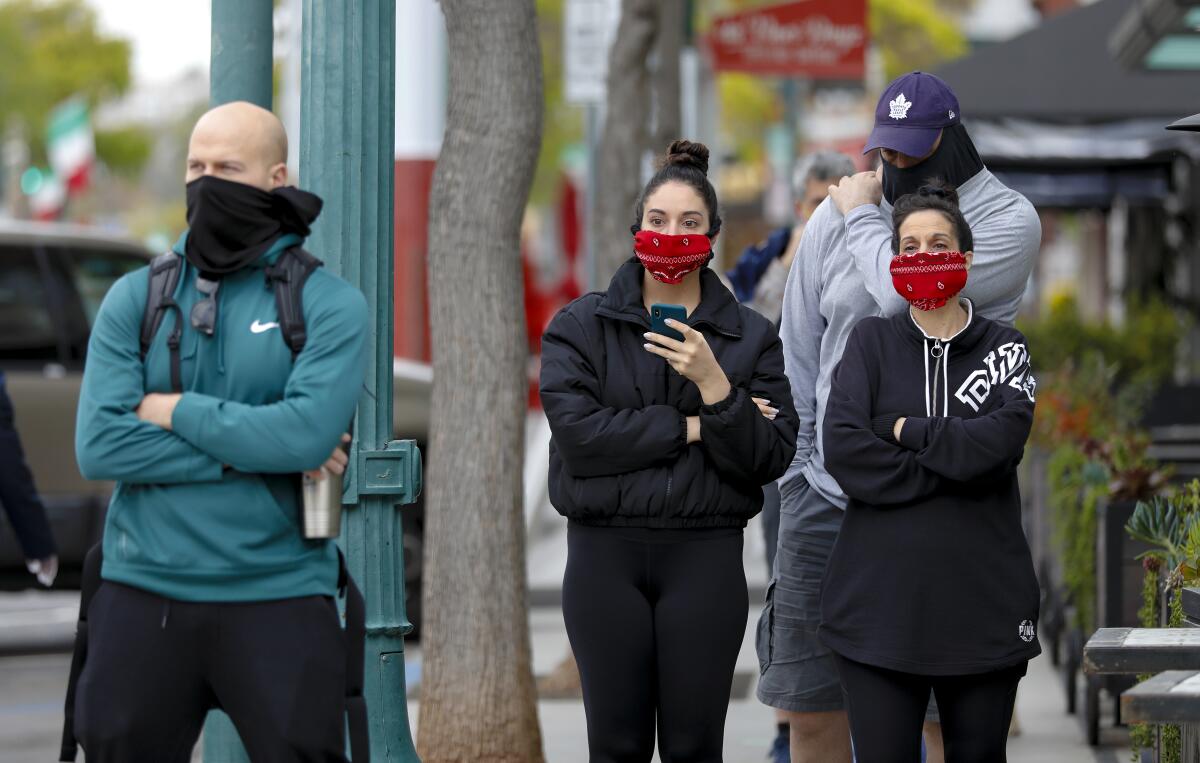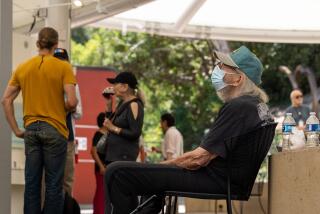‘I see a lot of COVID and a lot of Omicron’: California warned of coming wave

Customers waiting in a line practice masking and social distancing.
SAN FRANCISCO — With the Christmas holidays approaching, California officials are warning of heightened dangers from a winter surge driven by the combined Delta and Omicron variants.
Rising numbers
Nationally, at least 319 Omicron cases have been confirmed, with at least 49 in California.
Of the 30 total Omicron cases in L.A. County, 24 people were fully vaccinated and four had also received booster doses. None is known to have been hospitalized, and none has died.
Officials have said vaccinations and boosters can help battle Omicron, which threatens hospitals due to its explosive spread. Even if the variant turns out to pose less risk for severe disease, the sheer increase in its transmissibility could still result in hospitals being overwhelmed.
Authorities do not expect this winter to be anywhere near as bad as last winter, given the availability of vaccinations this year. Nonetheless, the U.S. and California are already dealing with a Delta winter surge.
“Unfortunately, we’re seeing indications of a winter surge on the heels of the Thanksgiving holiday,” said L.A. County Public Health Director Barbara Ferrer. “Case rates and daily hospitalization admissions are steadily increasing, and we anticipate that they will continue to increase as we enter the winter holidays.”
Nationally, the U.S. Centers for Disease Control and Prevention forecasts that more than 1 million new coronavirus cases could be recorded the week of Christmas. By contrast, around Halloween, there were 500,000 new weekly cases.
Statewide, COVID-19 hospitalizations are up 16% since Nov. 24, and in much of Southern California, the increases are worse.
Over the same period, COVID-19 hospitalizations have increased by 106% in Ventura County, 41% in San Diego County, 40% in L.A. County, 35% in Riverside County, 27% in San Bernardino County and 7% in Orange County.
Omicron is intensifying
Even health officials in highly vaccinated areas such as the San Francisco Bay Area began sounding more concerned this week about Omicron.
Omicron has now been detected in all sewage areas monitored by Santa Clara County, the home of Silicon Valley, meaning the variant “is present, at some level, in all parts of the county,” said local public health director Dr. Sara Cody.
Cody noted that highly vaccinated countries including Denmark and Norway have seen “explosive growth of Omicron.”
“What I see is perhaps one of the most challenging moments that we’ve had yet in the pandemic. And I think it’s challenging because it’s not what we’re expecting,” Cody said. “We’ve all come to learn to live with COVID over the last two years, and we’re all a bit tired. But I want to let you know that when I look around the corner, I see a lot of COVID and a lot of Omicron.”
Health officials say that there is no need to return to stay-at-home orders and that holiday gatherings can be held.
Some suggested it would be less risky to hold gatherings in smaller sizes and among people who are fully vaccinated and boosted, adding that people should get a rapid test before meeting up.
Vaccinations key
“For unvaccinated, we are looking at a winter of severe illness and death — if you’re unvaccinated — for themselves, their families, and the hospitals they’ll soon overwhelm,” President Biden said Thursday. “But there’s good news: If you’re vaccinated and you had your booster shot, you’re protected from severe illness and death — period.”
For those who are unvaccinated, getting even the first shot will help, Biden said in remarks just after meeting with members of his COVID-19 response team.
Other officials agree.
“We will, in fact, see a pretty significant surge in our cases. And depending on exactly how large that increase is, it can, in fact, result in really placing way too much stress on the hospitals,” Los Angeles County Public Health Director Barbara Ferrer said, even if a smaller percentage of newly infected people need hospital care.
“Given what we know, Omicron does pose a significant threat to our community in L.A.,” Ferrer said. “Unvaccinated individuals appear to remain at the highest risk. But all the evidence to date indicates that those fully vaccinated are also at increased risk, particularly for getting infected and infecting others.”
Ferrer said higher-risk people may want to decide to avoid attending large, crowded indoor events, such as weddings with hundreds of people in poorly ventilated areas, during this period of intense viral transmission. Other strategies that can keep a winter surge from getting bad include adhering to the requirement to wear masks in indoor public settings, staying home if feeling the slightest bit of illness, and taking rapid tests just before meeting up at parties or gatherings.
“To prevent ourselves from getting into trouble over the holidays, we’re asking everyone to take a lot of caution as you gather and celebrate. If we fail to take common sense safety measures right now, we could find ourselves in a dangerous place by the end of the month and into January, which could dramatically impede our recovery, Ferrer said.
More to Read
Sign up for Essential California
The most important California stories and recommendations in your inbox every morning.
You may occasionally receive promotional content from the Los Angeles Times.











